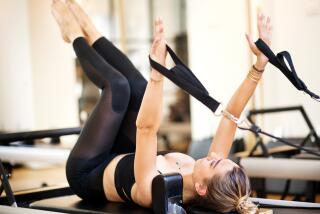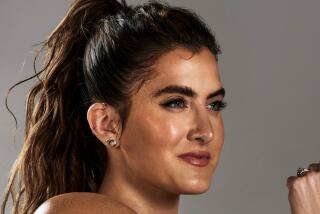Plunge into the joy of movement
There we stood in our color-coded bathing caps, 1,336 women -- nervous, excited and all lined up in “waves” on a recent summer Sunday morning on the shores of (I kid you not) Lake Chargoggagoggmanchauggauggagoggchaubunagungamaugg near Webster, Mass.
For each of us -- we ranged from 27 teenagers to five hardy souls in their early 60s -- the goal was at least to finish this Danskin triathlon, a mere “sprint,” or short, triathlon in the world of more or less extreme sports, but a daunting enough challenge for many participants who, like me, had never done such a thing.
We were about to wade into the lake’s 77-degree, beautifully clear water, trying not to drown as sleeker, faster bodies swarmed over us, to swim a half-mile course around a series of orange buoys.
It was glorious, a total high, just to be part of this mob of slightly crazy women with gorgeous legs, pretty, muscular arms and energetic, delighted faces. There was a sense of unrestrained exuberance in the air and a feeling of immense gratitude, at least on my part, to have the good health to even contemplate such an event.
Which made me wonder. Why do so many people hate exercise? Why do doctors’ urgings about the medical benefits of exercise fall on so many deaf ears?
My new theory is that we’ve been misguidedly selling exercise as a medical duty, a “should,” when it’s really a form of constructive selfishness, a shortcut to joy and self-affirmation in lives that already have too many “shoulds.”
Granted, the medical reasons to exercise are endless. Exercise physiologist Bill Evans of the University of Arkansas for Medical Sciences estimates that regular exercise can prolong life by 2 1/2 years, if you start at age 35, and by six months even if you start at 75.
A Harvard study that has followed 17,000 men for decades has found that vigorous exercise (expending 1,500 calories a week or more in physical activity, including brisk walking) reduces the risk of mortality in any given year by 25%.
“Physical activity is the closest thing that we have to a magic bullet for health,” says Dr. I-Min Lee, associate professor of medicine at Harvard Medical School. “There is no single drug that can give the same overall benefit to health that physical activity does. Everything that gets worse as we get older gets better with exercise. Even moderate-intensity exercise such as brisk walking, 30 minutes a day, is sufficient to lower the risk of stroke, heart disease and diabetes, in both men and women.”
The medical benefits go on and on. Studies at the Cooper Institute in Dallas show that the death rate from all causes is about 50% less in moderately fit men and women than in the non-fit at any given time.
Indeed, an article in the New England Journal of Medicine last year concluded that “poor physical fitness is a better predictor of death than many other factors, including smoking, hypertension and heart disease.” Other studies show that exercise dramatically improves the quality, as well as the duration, of life, not just by reducing the risk of physical diseases but by reducing depression, stress and anxiety.
And yet, many Americans don’t do it. Figures released earlier this year by the National Center for Health Statistics show that while one in five Americans engages in a high level of regular physical activity, an astounding one in four “engage in little or no regular physical activity.” The data come from 32,000 interviews held in 2000.
That’s appalling, given that it doesn’t take all that much exercise to meet the government’s recommendations, which say, among other things, that a person should engage in physical activity, at work or at leisure, that causes light sweating or a slight to moderate increase in breathing or heart rate five times or more a week for at least 30 minutes each time.
The excuses people offer for not doing this minimum are legion. Too busy with kids, work and housework. Too fat to look decent in exercise clothes. No place to walk in dangerous neighborhoods. Too tired. Too impatient to build up stamina slowly.
So take it from a newly minted triathlete who, like all but eight women in the Danskin triathlon, finished the course, with glee (and great admiration for the winner, who finished in 1 hour, 5 minutes, 29 seconds).
Don’t think of exercise as one more “should” in your life. Think of it as a treat, a break from the kids and the computer. A time to get away by yourself, or to socialize with fellow walkers. It’s not just for your body. It’s for your soul.


